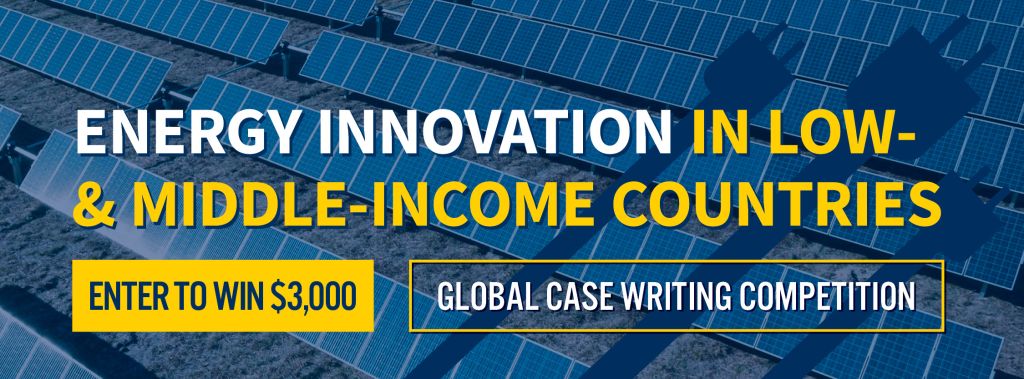Energy-Focused Business Education: WDI Opens a New Case Study Contest
Tuesday, December 6, 2022

A global energy transition is underway. WDI’s latest case writing competition aims to increase the pool of higher education case studies on this critical topic.
The world needs a major investment boost around energy output and infrastructure to meet challenges related to demand, security, and sustainability — and many of the changes will take place in emerging markets. Leaders in these nations are working hard to achieve ambitious development goals, and governments, businesses, and other stakeholders will be integral in securing the $1.3 trillion that is estimated to be needed to support the growing global population, according to J.P. Morgan’s Annual Energy Outlook. Fulfilling this demand calls for innovation, and innovation requires new voices and new ways of improving business knowledge.
This is why the William Davidson Institute at the University of Michigan (WDI) has launched the Energy Innovation in Low- and Middle-Income Countries Global Case Writing Competition. Administered by WDI Publishing, the contest is seeking new voices and expertise in the form of business case studies.
THE POWER OF CASE STUDIES
Case studies encourage current and future business leaders to expand their education, question their assumptions and discover innovative strategies. The development and use of these cases will help accelerate global understanding of the energy technologies and innovations being implemented by businesses operating in low- and middle-income countries (LMICs).
At the moment, the energy industry is facing large-scale and complex challenges, while the transition away from fossil fuels is creating new opportunities, especially in LMICs. According to the International Renewable Energy Agency, 733 million people are currently living without electricity and 2.6 billion people — many of whom are in LMICs — cook or heat their homes with fuels that are harmful to their health and the environment. These challenges can’t be resolved with old solutions and ways of thinking. Universities and colleges have the power to integrate new approaches and business models for energy challenges into their curricula to prepare the next generation of decision-makers.
“Global competitions like this can draw out new research and initiatives that we may not otherwise know about,” said Sandra Draheim, Manager of Case Publishing at WDI. “By incentivizing and rewarding the development of new cases, we aim to help students to be better informed and equipped to lead companies into the future, especially those companies focused on generating and executing innovative energy solutions in emerging markets. WDI’s case writing competition seeks to broaden and increase the pool of studies available on this essential topic.”
JOINING THE COMPETITION
Students, faculty and professionals connected to the energy industry in LMICs are uniquely positioned to enhance this discussion. “Many of these changes are happening rapidly, and maybe not yet at a large scale, so new case studies can add a lot of value to the knowledge around this topic by capturing lessons learned in real-time, analyzing what is and is not working, and shining a spotlight on promising approaches,” says Dana Gorodetsky, Program Manager of Energy at WDI.
With that in mind, WDI’s Energy Innovation in Low- and Middle-Income Countries Global Case Writing Competition is a call for cases focused on compelling energy questions arising from profit-seeking businesses in emerging markets.
The competition is open to submissions from practitioners, students and faculty from around the globe. Practitioners and students must enter in collaboration with a faculty member.
An informational webinar will be held at 10 am EST, Dec. 14, and will provide an overview of the competition, as well as case writing tips. Intent-to-Enter forms are due on Jan. 31, 2023, and the final submission deadline is March 31, 2023. Find the submission requirements here.
Finalist cases will be reviewed and ranked by several industry experts: Deeana Ahmed, Vice President of Strategy, Policy, and Sustainability at ONE; Kate Gasparro, Director of Land Development and Sustainability at Bedrock Detroit; Ann O’Hara, President of Huhtamaki North America; and Dan Vermeer, Associate Professor of the Practice of Energy & Environment and Executive Director of the Center for Energy, Development, and the Global Environment at Duke University’s Fuqua School of Business.
Winners won’t just get the chance to contribute their unique perspectives to this meaningful conversation, they’ll also earn an award after the public announcement in July 2023. The first-place winner will receive $3,000, second-place $2,000, and third-place $1,000.
